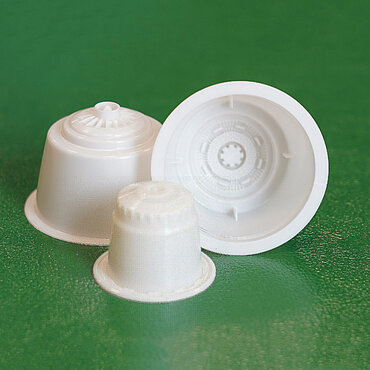Sirmax Group debuts at Interpack 2023 with updates on two of its fast- growing business units: Bioplastics and recycled plastics.
Compostable bioplastics, under the BioComp brand, are completely biodegradable and compostable materials that can be disposed of as organic waste. Their physical and mechanical characteristics mean they can replace traditional plastics such as polyethylene (LD-PE, HD-PE), polypropylene (PP), and polystyrene (PS) in different fields. Given their composition derived from plant-derived biomass, they also have the added benefit of being Bio-Based by nature.
The compound derived from post-consumer plastic (disposed of as urban waste) is intended for the production of recycled HD-PE (high-density polyethylene) granules and thermoplastic recycled polypropylene granules, also from urban waste, which are then used as a ‘refined’ raw material to make compounds for durable goods.
Rigid food packaging, new formulations for thermoforming
Within the BioComp family, Sirmax has fine-tuned and optimized new formulations which are specifically dedicated to injection molding and extrusion, both of ready-made items and sheets for thermoforming. The granules, which are bio-compostable, are intended for the manufacture of plates, cutlery, glasses, food take-out trays, and, more generally, for anything involving rigid food packaging, which can then be disposed of with the organic waste. The same material can also be specially modified to create an injection molding version suitable, for example, for coffee capsules. These materials are commercially recognized with the ‘IM’ abbreviation.
Complete solutions for coffee capsules
On the subject of coffee capsules (which are currently mostly made of aluminum or traditional plastic and have recently been subject to new regulatory developments at European level), Sirmax has developed a complete solution that provides both the material for making the rigid capsule –with mechanical and thermal characteristics able to withstand high temperatures – and a special barrier film material, i.e., the flexible covering of the capsule that comes in contact with food.
More generally, the historical products in the Biocomp range, identified through ‘BF’ codes, cover a wide variety of applications in the flexible packaging sector, and therefore lend themselves to being processed through blown extrusion to make bags for fruit and vegetables (disposed of as organic waste) and various types of shopping bags. All BioComp branded products are also UNI EN 13432 compliant and OK Compost Industrial certified. Some grades even boast the more stringent OK Compost HOME certification.
This means that once the manufactured good has disposed of and sent to the appropriate composting center, it will return as useful fertilizer for new crops, alongside other organic waste. In fact, certified non-toxicity tests have established that the material, once broken down and turned into compost, does not affect the properties of the soil itself but contributes to the lush growth of plants.

Fully compostable Dog Poop Bags and recycled plastic for detergent containers
Dog Poop Bags are a new all-Italian product intended for the collection of dog droppings by BioSave PlasticFree, a Gubbio-based startup, and made with Sirmax bioplastics. Traditional plastic bags create mixed waste destined to saturate landfills, to be incinerated or, in the worst-case scenario, to be abandoned in the environment, producing pollution. BioSave PlasticFree bags are fully recyclable, 100% compostable and UNI EN 13432 certified as OK Compost HOME. This is a unique product that responds to European directives on waste reduction as it can be disposed of as organic waste.
At Interpack, the Sirmax Group will also present a 100% recycled post-consumer compound intended for the detergent sector. These granules are intended for bottle to bottle recycling, i.e., for the production of bottles and jerry cans for household cleaning/personal hygiene products and liquid products used in the construction industry, starting from virgin plastic bottles and containers born with the same use destination. Sirmax's initiative starts from a specific market need: To date, bottle to bottle recycling mainly uses blends of recycled plastic and virgin plastic. In contrast, Sirmax aims to use 100% post-consumer, higher quality plastic, producing a material that is suitable for processing through blow molding.

